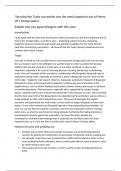‘Securing the Tudor succession was the most important aim of Henry
VII’s foreign policy’.
Explain why you agree/disagree with this view.
Introduction
I fully agree with the view that securing the Tudor succession was the most important aim of
Henry VII’s foreign policy, as all of his aims – protecting national security, improving
England’s finances (mainly through trade) and gaining recognition for the Tudor dynasty
(and thus securing the succession) – all ensured that the Tudor dynasty would survive and
continue after Henry’s death.
Trade
One way in which we can say that Henry’s most important foreign policy aim was securing
the succession is seen in his willingness to sacrifice trade in order to protect the dynasty.
Whilst trade was one of henry’s 3 main aims, it was often sacrificed, or seen as less
important, especially if he came to choosing between securing the dynasty or furthering
trade. One such example of this was Henry’s relationship with Burgundy. Burgundy was an
important trading route, especially as Antwerp (a place in Burgundy) was the centre of the
cloth trade – England’s main export. However, burgundy, particularly Margaret of Burgundy
(Richard III’s sister, and strong Yorkist supporter) continuously gave pretenders to the
English throne, such as Perkin Warbeck and Lambert Simnel, money and troops to aid them
in overthrowing henry. Their presence, especially when supported by a major foreign
power, could be said to have severely threatened the Tudor dynasty. As such, Henry decided
that the best way to force the Burgundians into abandoning the pretenders was to enforce a
trade embargo in 1493, which lasted three years. This severely damaged the English
economy, and particularly the cloth trade, as they could no longer sell goods to their main
buyers. It was only reversed once Burgundy agreed to stop supporting the pretenders. As
such, we can see that securing the succession was the most important of Henry’s foreign
policy aims, as when he was forced to choose between furthering his trading interests or
protecting the dynasty against the pretenders, he chose the latter, despite the
consequences that the trade embargo had. It could also be said that trade is his least
important aim, as it is the aim that is sacrificed the most in Henry’s foreign affairs.
National security and avoiding war
Another way in which Henry secured the succession was by protecting national
security, by getting rid of pretenders (as previously mentioned), and by avoiding war.
For example, when there was a potential for conflict with Scotland in 1496, as they
were harbouring Perkin Warbeck, Henry continuously offered a peace treaty in order
to avoid having to go to war.
This resulted in the treaty of Ayton, in 1497, and the Treaty of Perpetual Peace in
1499.




